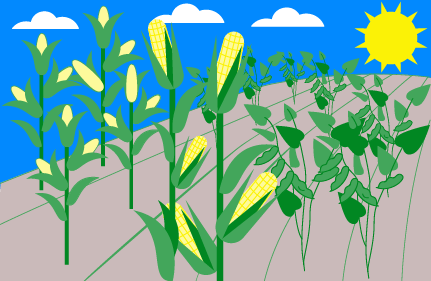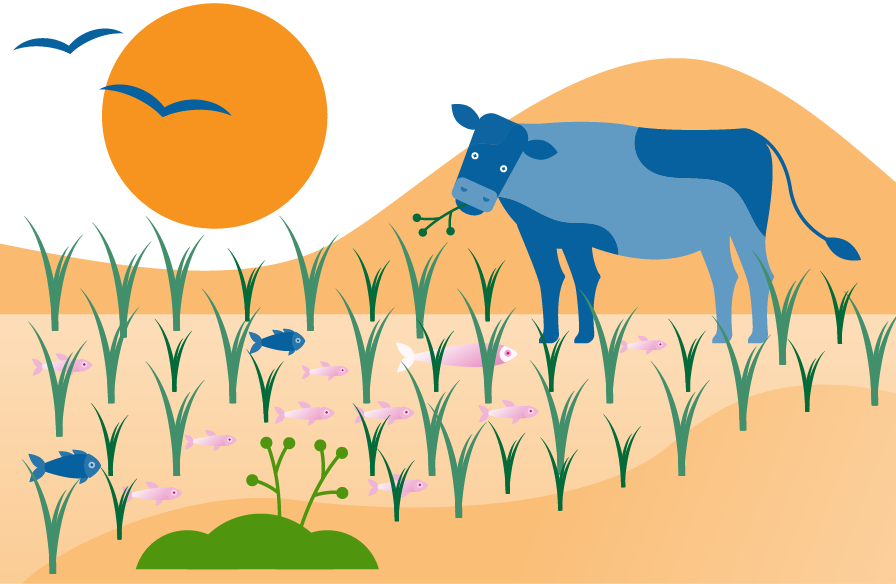Agricultural Biotechnology Seminar Series 2024 – Seminar 3: The Role of Agricultural Biotechnologies in Increasing Productivity and Reducing Food Loss and Waste
-

November 19, 2024
8:00 am - 10:45 amVirtual (UTC+7)
Jakarta, Indonesia
Agricultural biotechnology is a revolutionary tool in modern agriculture. It has provided farmers with crops that are resistant to diseases and can grow in stressful environments, including drought, high heat, and high salt conditions. This technology has not only contributed to high agricultural productivity and nutrition, it has also enabled the mitigation of postharvest food losses by providing solutions to potentially reduce food loss and waste, as well as prevent spoilage in stored produce. These innovations have the potential to spur economic growth, address hunger and malnutrition, and lessen the impacts of agriculture on the environment.
The third seminar in the 2024 Agricultural Biotechnology Seminar Series, this expert-led event facilitated the delivery of presentations on the role of agricultural biotechnologies in increasing productivity and reducing losses in food waste, providing a platform to share the developments in agricultural biotechnology taking place in Indonesia. It was implemented by the Agriculture & Food Systems Institute (AFSI), with Indonesia as the sponsoring economy and host of the event. The Ministry of Agriculture and the National Research and Innovation Agency (BRIN) of Indonesia were the lead agencies for this seminar.
Agricultural Biotechnology Seminar Series
By bringing together policymakers, risk assessors, and scientists, the series seeks to foster greater participation and enhance engagement in the APEC High Level Policy Dialogue on Agricultural Biotechnology (HLPDAB) outside of the annual meeting.
This seminar’s objectives were:
- Deliver an update on the regulation of agricultural biotechnology in Indonesia, including genome editing for products.
- Provide an opportunity to discuss the research, development, and approval of products of agricultural biotechnology to advance crop productivity and enable climate tolerance.
- Explore the application of genome editing to prevent food loss and waste
- Improve understanding of the technical and policy barriers to agricultural biotechnology.

Agenda
8:00 am
Technical Introduction
Dr. Bhavneet Bajaj
Senior Manager – Scientific Programs, Agriculture & Food Systems Institute (AFSI), USA
8:05 am
Welcome and Opening Remarks
Dr. Arif Surahman
Director, Center for Agricultural Biotechnology and Genetic Resources Instrument Standard Testing, Indonesia
Dr. Puji Lestari
Chairwoman, Research Organization of Agriculture and Food, National Research and Innovation Agency (BRIN), Indonesia
8:15 am
Overview of Indonesia’s Regulation on the Approval of GM Crops and Genome Editing Products
Prof. Dr. Bambang Prasetya
Chairman, National Biosafety Commission of Genetically Engineered Products, Indonesia
8:30 am
Genetically Engineered Indonesian Potato, Bio Granola, Resistant to Late Blight Pathogen Phytophthora infestans
Mr. Kusmana Kusmana
Researcher, Research Center for Horticulture, National Research and Innovation Agency (BRIN), Indonesia
8:45 am
Biotechnology for Enhancing Growth and Yield in Sugarcane
Prof. Dr. Bambang Sugiharto
Director, Center for Development of Advanced Science & Technology (CDAST), Jember University, Indonesia
9:00 am
Moderated Q&A Session
Dr. Bhavneet Bajaj
9:20 am
Break
9:30 am
Biotechnology for Improving Nutritional Quality in Rice
Dr. Aris Hairmansis
Research Group Leader – Rice Breeding, Research Center for Food Crops, National Research and Innovation Agency (BRIN), Indonesia
9:45 am
Global Developments in Agricultural Biotechnology
Dr. Andrew Roberts
Chief Executive Officer, Agriculture & Food Systems Institute, USA
10:00 am
Potential of Genome Editing in Reducing Postharvest Waste and Loss of Fruit, Vegetables, and Ornamentals
Dr. Diane M. Beckles
Professor, Department of Plant Sciences, University of California, Davis, USA
10:15 am
Moderated Q&A Session
Dr. Bhavneet Bajaj
10:35 am
Closing Remarks
Dr. Dwinita Wikan Utami
Head of the Research Center for Horticulture, Research Organization of Agriculture and Food, National Research and Innovation Agency (BRIN), Indonesia
Speakers
Dr. Arif Surahman
Director, Center for Agricultural Biotechnology and Genetic Resources Instrument Standard Testing, Indonesia
 Dr. Arif Surahman is the Director of the Indonesian Center for Agricultural Biotechnology and Genetic Resources Instrument Standard Testing, an institution focused on agricultural biotechnology and genetic resources in Indonesia. He holds a bachelor’s degree in fisheries from Diponegoro University, obtained in 1995. He went on to earn a master’s degree in aquaculture and aquatic resources management from the Asian Institute of Technology (AIT) in Thailand in 2002 and a doctoral degree in agricultural systems and engineering from AIT in 2017. From 1998 to 2020, Dr. Surahman worked as a research scientist under the Ministry of Agriculture. He has contributed to numerous national and international scientific publications. Currently, he also serves as the coordinator for the GMO Technical Team for Feed and as the Supervisory Coordinator for GMO Crop in Indonesia.
Dr. Arif Surahman is the Director of the Indonesian Center for Agricultural Biotechnology and Genetic Resources Instrument Standard Testing, an institution focused on agricultural biotechnology and genetic resources in Indonesia. He holds a bachelor’s degree in fisheries from Diponegoro University, obtained in 1995. He went on to earn a master’s degree in aquaculture and aquatic resources management from the Asian Institute of Technology (AIT) in Thailand in 2002 and a doctoral degree in agricultural systems and engineering from AIT in 2017. From 1998 to 2020, Dr. Surahman worked as a research scientist under the Ministry of Agriculture. He has contributed to numerous national and international scientific publications. Currently, he also serves as the coordinator for the GMO Technical Team for Feed and as the Supervisory Coordinator for GMO Crop in Indonesia.
Dr. Puji Lestari
Chairwoman, Research Organization of Agriculture and Food National Research and Innovation Agency (BRIN), Indonesia
 Dr. Puji Lestari is the Chairwoman of the Research Organization for Agriculture and Food at the National Research and Innovation Agency (BRIN) in Indonesia, an institution dedicated to advancing research in the food and agriculture sectors. She holds a bachelor’s degree from IPB University and a Ph.D. in plant biotechnology from Seoul National University in South Korea, where she also completed a post-doctoral fellowship, significantly enhancing her expertise in molecular biology. Dr. Lestari began her career as a researcher at the Indonesian Center for Agricultural Biotechnology and Genetic Resources Research and Development under the Ministry of Agriculture, where she worked from 1994 to 2022. With over 30 years of experience in research and development, she has led numerous national and international scientific publications and holds several patents and other intellectual property rights. Dr. Lestari has been recognized with multiple prestigious awards, including a grant from the World Bank’s University Research for Graduate Education (URGE) program, a fellowship from South Korea’s National Institute for International Education Development (NIIED), and funding from the Islamic Development Bank (IDB) and the Indonesia Endowment Fund for Education (LPDP) to support international publications in 1996, 2008, 2011, and 2016, respectively.
Dr. Puji Lestari is the Chairwoman of the Research Organization for Agriculture and Food at the National Research and Innovation Agency (BRIN) in Indonesia, an institution dedicated to advancing research in the food and agriculture sectors. She holds a bachelor’s degree from IPB University and a Ph.D. in plant biotechnology from Seoul National University in South Korea, where she also completed a post-doctoral fellowship, significantly enhancing her expertise in molecular biology. Dr. Lestari began her career as a researcher at the Indonesian Center for Agricultural Biotechnology and Genetic Resources Research and Development under the Ministry of Agriculture, where she worked from 1994 to 2022. With over 30 years of experience in research and development, she has led numerous national and international scientific publications and holds several patents and other intellectual property rights. Dr. Lestari has been recognized with multiple prestigious awards, including a grant from the World Bank’s University Research for Graduate Education (URGE) program, a fellowship from South Korea’s National Institute for International Education Development (NIIED), and funding from the Islamic Development Bank (IDB) and the Indonesia Endowment Fund for Education (LPDP) to support international publications in 1996, 2008, 2011, and 2016, respectively.
Prof. Dr. Bambang Prasetya
Chairman, National Biosafety Commission of Genetically Engineered Products, Indonesia
 Prof. Dr. Bambang Prasetya is the Chairman of the National Biosafety Commission of Genetically Engineered Products in Indonesia and also currently works at the Center for Testing Technology and Standards Research at the National Research and Innovation Agency (BRIN). He graduated from IPB University and the University of Göttingen in Germany. From 2012 to 2020, he served as Chairman of the National Agency for Standardization (BSN) and Head of the National Accreditation Committee (KAN), acting as the national focal point and chair for ISO and CODEX international standards. He has held positions as Deputy of Life Sciences at the Indonesian Institute of Sciences (LIPI), Head of the Biotechnology Research Center at LIPI, and Deputy for Techno Economy and Deputy for Research and Technology Programs at the Ministry of Research and Technology of the Republic of Indonesia. Currently, he is also the Chair of Komtek 13-14, ISO TC 331, a jury member for the National Quality “SNI Award,” and a member of the Indonesian Academy of Sciences (AIPG). He has served as Vice Chair and Advisory Board member of the Asian Federation on Biotechnology (AFOB) and was Chairman of the Indonesian Biotechnology Consortium (KBI) from 2010 to 2017. Prof. Prasetya received the President of the Republic of Indonesia’s Karya Pembangunan Award in 2003 and 2007.
Prof. Dr. Bambang Prasetya is the Chairman of the National Biosafety Commission of Genetically Engineered Products in Indonesia and also currently works at the Center for Testing Technology and Standards Research at the National Research and Innovation Agency (BRIN). He graduated from IPB University and the University of Göttingen in Germany. From 2012 to 2020, he served as Chairman of the National Agency for Standardization (BSN) and Head of the National Accreditation Committee (KAN), acting as the national focal point and chair for ISO and CODEX international standards. He has held positions as Deputy of Life Sciences at the Indonesian Institute of Sciences (LIPI), Head of the Biotechnology Research Center at LIPI, and Deputy for Techno Economy and Deputy for Research and Technology Programs at the Ministry of Research and Technology of the Republic of Indonesia. Currently, he is also the Chair of Komtek 13-14, ISO TC 331, a jury member for the National Quality “SNI Award,” and a member of the Indonesian Academy of Sciences (AIPG). He has served as Vice Chair and Advisory Board member of the Asian Federation on Biotechnology (AFOB) and was Chairman of the Indonesian Biotechnology Consortium (KBI) from 2010 to 2017. Prof. Prasetya received the President of the Republic of Indonesia’s Karya Pembangunan Award in 2003 and 2007.
Mr. Kusmana Kusmana
Researcher, Research Center for Horticulture, National Research and Innovation Agency (BRIN), Indonesia
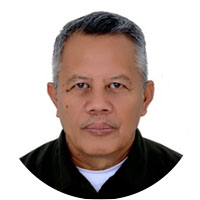 Mr. Kusmana is a researcher at the Research Center for Horticulture within the National Research and Innovation Agency (BRIN) in Indonesia. He graduated from University Bandung Raya. His professional experience includes serving as a Research Assistant at the International Potato Center for East Southeast Asia and the Pacific Region from 1990 to 2000, followed by over two decades as a Potato Breeder at the Indonesian Vegetable Research Institute, Ministry of Agriculture. Since 2022, he has been a researcher at BRIN. Throughout his career, Kusmana has produced numerous scientific publications, including books, journals, and conference proceedings. In 2021, he received The Best Indonesian Breeder Award from Bogor Agricultural University in collaboration with East West Seed Indonesia. He has released more than 20 potato varieties and has obtained licenses for four of these varieties between 2015 and 2024.
Mr. Kusmana is a researcher at the Research Center for Horticulture within the National Research and Innovation Agency (BRIN) in Indonesia. He graduated from University Bandung Raya. His professional experience includes serving as a Research Assistant at the International Potato Center for East Southeast Asia and the Pacific Region from 1990 to 2000, followed by over two decades as a Potato Breeder at the Indonesian Vegetable Research Institute, Ministry of Agriculture. Since 2022, he has been a researcher at BRIN. Throughout his career, Kusmana has produced numerous scientific publications, including books, journals, and conference proceedings. In 2021, he received The Best Indonesian Breeder Award from Bogor Agricultural University in collaboration with East West Seed Indonesia. He has released more than 20 potato varieties and has obtained licenses for four of these varieties between 2015 and 2024.
Prof. Dr. Bambang Sugiharto
Director, Center for Development of Advanced Science & Technology (CDAST), Jember University, Indonesia
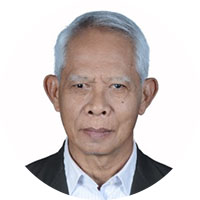 Prof. Dr. Bambang Sugiharto is the Director of the Center for Development of Advanced Science and Technology (CDAST) at Jember University, Indonesia. He received his Bachelor’s degree in Soil Science from the University of Jember in 1981 and went on to earn his Master’s degree in 1989 and PhD in 1992 in Molecular Plant Physiology from Nagoya University, Japan. In 1992, he was appointed as an assistant professor and later served as the head of the Research Center for Molecular Biology at Jember University from 1997 to 2004. He became a full professor in 2005 and has been the director of CDAST since 2013, a role he held until 2023. Prof. Sugiharto has established strong collaborations with Professor Hitoshi Sakakibara at Nagoya University and Tropical Agriculture Research Front-JIRCAS in Ishigaki, Japan. He has also worked as a research consultant and co-researcher with the sugarcane company PT. Perkebunan Nusantara XI, and currently collaborates with PT. Dwi Cahaya Tembakau in Indonesia. His research interests focus on photosynthetic carbon assimilation, drought tolerance, and virus resistance in C4 plants such as maize, sugarcane, and sorghum. His current projects include studies on the function of engineered sucrose-phosphate synthase from sugarcane, gene regulation for photosynthetic carbon assimilation in C4 plants under water stress, and the development of transgenic sugarcane resistant to sugarcane mosaic virus.
Prof. Dr. Bambang Sugiharto is the Director of the Center for Development of Advanced Science and Technology (CDAST) at Jember University, Indonesia. He received his Bachelor’s degree in Soil Science from the University of Jember in 1981 and went on to earn his Master’s degree in 1989 and PhD in 1992 in Molecular Plant Physiology from Nagoya University, Japan. In 1992, he was appointed as an assistant professor and later served as the head of the Research Center for Molecular Biology at Jember University from 1997 to 2004. He became a full professor in 2005 and has been the director of CDAST since 2013, a role he held until 2023. Prof. Sugiharto has established strong collaborations with Professor Hitoshi Sakakibara at Nagoya University and Tropical Agriculture Research Front-JIRCAS in Ishigaki, Japan. He has also worked as a research consultant and co-researcher with the sugarcane company PT. Perkebunan Nusantara XI, and currently collaborates with PT. Dwi Cahaya Tembakau in Indonesia. His research interests focus on photosynthetic carbon assimilation, drought tolerance, and virus resistance in C4 plants such as maize, sugarcane, and sorghum. His current projects include studies on the function of engineered sucrose-phosphate synthase from sugarcane, gene regulation for photosynthetic carbon assimilation in C4 plants under water stress, and the development of transgenic sugarcane resistant to sugarcane mosaic virus.
Dr. Aris Hairmansis
Research Group Leader – Rice Breeding, Research Center for Food Crops, National Research and Innovation Agency (BRIN), Indonesia
 Dr. Aris Hairmansis is the Research Group Leader for Rice Breeding at the Research Center for Food Crops (RCFC) within the National Research and Innovation Agency (BRIN) in Indonesia. He earned his Bachelor’s degree in Agronomy from Brawijaya University in 2001, followed by a Master’s degree in Plant Breeding from IPB University in 2005, and a PhD in Plant Science from the University of Adelaide in 2014. From 2001 to 2022, he worked as a rice breeder at the Indonesian Center for Rice Research under the Ministry of Agriculture. In 2022, he joined RCFC at BRIN. His research focuses on rice breeding for environmental stress tolerance and nutritional quality improvements, utilizing both conventional and biotechnology approaches. His team has successfully released 24 rice varieties for commercial cultivation in Indonesia. Dr. Hairmansis is actively involved in various research projects in collaboration with international organizations such as IRRI, JIRCAS, and CIRAD. He currently leads the rice breeding research group at RCFC.
Dr. Aris Hairmansis is the Research Group Leader for Rice Breeding at the Research Center for Food Crops (RCFC) within the National Research and Innovation Agency (BRIN) in Indonesia. He earned his Bachelor’s degree in Agronomy from Brawijaya University in 2001, followed by a Master’s degree in Plant Breeding from IPB University in 2005, and a PhD in Plant Science from the University of Adelaide in 2014. From 2001 to 2022, he worked as a rice breeder at the Indonesian Center for Rice Research under the Ministry of Agriculture. In 2022, he joined RCFC at BRIN. His research focuses on rice breeding for environmental stress tolerance and nutritional quality improvements, utilizing both conventional and biotechnology approaches. His team has successfully released 24 rice varieties for commercial cultivation in Indonesia. Dr. Hairmansis is actively involved in various research projects in collaboration with international organizations such as IRRI, JIRCAS, and CIRAD. He currently leads the rice breeding research group at RCFC.
Dr. Andrew Roberts
Chief Executive Officer, Agriculture & Food Systems Institute (AFSI), USA
 Dr. Andrew Roberts joined the Agriculture & Food Systems Institute (AFSI) in December 2009 as the Deputy Director of the Center for Environmental Risk Assessment (CERA), where he developed tools and materials for use in training and capacity building related to the problem formulation approach to environmental risk assessment and served as the coordinator for CERA’s capacity building projects under the USAID-funded South Asia Biosafety Program (SABP) and the World Bank-funded Partnership for Biosafety Risk Assessment and Regulation, in Bangladesh, Pakistan, and Vietnam. He also provided technical support for capacity building work in Brazil, India, Japan, Chile, and South Africa. In January 2015, he became the director of CERA, as well as the Center for Safety Assessment of Food and Feed (CSAFF), which worked on food and feed safety assessment for foods derived from genetically engineered plants. The two centers were later consolidated under the Research Foundation, for which he became Deputy Executive Director in January 2017. When the organization became the Agriculture & Food Systems Institute in 2020, his title shifted to Vice President – Biotechnology, and he assumed the role of Chief Executive Officer later that year.
Dr. Andrew Roberts joined the Agriculture & Food Systems Institute (AFSI) in December 2009 as the Deputy Director of the Center for Environmental Risk Assessment (CERA), where he developed tools and materials for use in training and capacity building related to the problem formulation approach to environmental risk assessment and served as the coordinator for CERA’s capacity building projects under the USAID-funded South Asia Biosafety Program (SABP) and the World Bank-funded Partnership for Biosafety Risk Assessment and Regulation, in Bangladesh, Pakistan, and Vietnam. He also provided technical support for capacity building work in Brazil, India, Japan, Chile, and South Africa. In January 2015, he became the director of CERA, as well as the Center for Safety Assessment of Food and Feed (CSAFF), which worked on food and feed safety assessment for foods derived from genetically engineered plants. The two centers were later consolidated under the Research Foundation, for which he became Deputy Executive Director in January 2017. When the organization became the Agriculture & Food Systems Institute in 2020, his title shifted to Vice President – Biotechnology, and he assumed the role of Chief Executive Officer later that year.
Prior to joining AFSI, Dr. Roberts worked at the U.S. Department of Agriculture (USDA) in several different capacities, all related to the regulation of agricultural biotechnology. He began his career at USDA as an AAAS Risk Policy Fellow in the Office of Science of Biotechnology Regulatory Services (BRS), the group responsible for regulating genetically engineered plants at USDA’s Animal Plant Health Inspection Service. After spending a year in the New Technologies office of the Foreign Agricultural Service serving as the lead for USDA’s efforts related to the Cartagena Protocol on Biosafety, he returned to BRS to serve in the International Affairs branch where he remained until joining AFSI.
Dr. Diane M. Beckles
Professor, Department of Plant Sciences, University of California, Davis, USA
 Dr. Diane Beckles is a Professor in the Department of Plant Sciences at the University of California, Davis. Her research focuses on identifying the genes that impact the postharvest quality of fruits, vegetables, and cereals, utilizing her expertise in biotechnology, biochemistry, and molecular physiology. She received her B.Sc. in Biotechnology from the University of Sheffield and her Ph.D. from the University of Cambridge. She has published over 80 research articles, book chapters, and technical articles. Dr. Beckles is a passionate advocate for the potential of gene editing to improve food security in developing economies. She collaborates with research groups and advises students globally, and she has received several awards for her research and mentorship efforts. Dr. Beckles is from Barbados and enjoys swimming with the green turtles in Carlisle Bay of her home country.
Dr. Diane Beckles is a Professor in the Department of Plant Sciences at the University of California, Davis. Her research focuses on identifying the genes that impact the postharvest quality of fruits, vegetables, and cereals, utilizing her expertise in biotechnology, biochemistry, and molecular physiology. She received her B.Sc. in Biotechnology from the University of Sheffield and her Ph.D. from the University of Cambridge. She has published over 80 research articles, book chapters, and technical articles. Dr. Beckles is a passionate advocate for the potential of gene editing to improve food security in developing economies. She collaborates with research groups and advises students globally, and she has received several awards for her research and mentorship efforts. Dr. Beckles is from Barbados and enjoys swimming with the green turtles in Carlisle Bay of her home country.
Dr. Bhavneet Bajaj
Senior Manager – Scientific Programs, Agriculture & Food Systems Institute (AFSI), USA
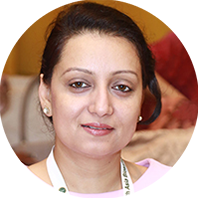 Dr. Bhavneet Bajaj joined the Agriculture & Food Systems Institute (AFSI) in July 2018 as Scientific Program Manager. She has been involved in projects related to safety assessment of foods and feeds derived from genetically engineered plants and serves as a resource person in providing technical support for capacity building programs in biotechnology. She was also the program lead for USDA-funded technical training for Chinese and Indonesian regulators and manages operations for both the Crop Composition Database and the World Nutrient Databases for Dietary Studies.
Dr. Bhavneet Bajaj joined the Agriculture & Food Systems Institute (AFSI) in July 2018 as Scientific Program Manager. She has been involved in projects related to safety assessment of foods and feeds derived from genetically engineered plants and serves as a resource person in providing technical support for capacity building programs in biotechnology. She was also the program lead for USDA-funded technical training for Chinese and Indonesian regulators and manages operations for both the Crop Composition Database and the World Nutrient Databases for Dietary Studies.
Prior to joining AFSI, Dr. Bajaj was a Visiting Scientist at the Sustainable Agricultural Systems Laboratory, Agricultural Research Service, USDA, where she worked on carotenoid pathway regulation in tomatoes. Before then, she was Associate Investigator with the Plant Protection group at (then) DuPont, where she devised a metabolic engineering strategy for insect control in soybean. While in India, she was an Assistant Professor at Jaipur National University, where she taught genetic engineering, enzymology, and biochemistry courses to M.Sc. level students. Her research work over the past 12 years involved plant secondary metabolites of nutritional, agricultural, and medicinal importance.
Dr. Dwinita Wikan Utami
Head of the Research Center for Horticulture, Research Organization of Agriculture and Food National Research and Innovation Agency (BRIN), Indonesia
 Dr. Dwinita Wikan Utami is the Head of the Research Center for Horticulture and a Senior Researcher at the Research Organization for Agriculture and Food within the National Research and Innovation Agency (BRIN) in Indonesia. She holds a doctoral degree in plant molecular biology from Bogor Agricultural University, with specialized expertise in rice molecular breeding. Dr. Utami has extensive research experience, contributing to high-impact studies in plant biotechnology, marker-assisted breeding, allele mining, and genome-wide association studies. In her leadership role, she directs innovative projects that connect scientific research with practical applications, advancing agriculture in significant ways. Known for her strategic management, problem-solving skills, and collaborative approach, she is dedicated to fostering impactful interdisciplinary research. Her achievements have been recognized by the Indonesian government, which awarded her the prestigious Adi Karya Pangan Nusantara for her contributions to national food resilience.
Dr. Dwinita Wikan Utami is the Head of the Research Center for Horticulture and a Senior Researcher at the Research Organization for Agriculture and Food within the National Research and Innovation Agency (BRIN) in Indonesia. She holds a doctoral degree in plant molecular biology from Bogor Agricultural University, with specialized expertise in rice molecular breeding. Dr. Utami has extensive research experience, contributing to high-impact studies in plant biotechnology, marker-assisted breeding, allele mining, and genome-wide association studies. In her leadership role, she directs innovative projects that connect scientific research with practical applications, advancing agriculture in significant ways. Known for her strategic management, problem-solving skills, and collaborative approach, she is dedicated to fostering impactful interdisciplinary research. Her achievements have been recognized by the Indonesian government, which awarded her the prestigious Adi Karya Pangan Nusantara for her contributions to national food resilience.

